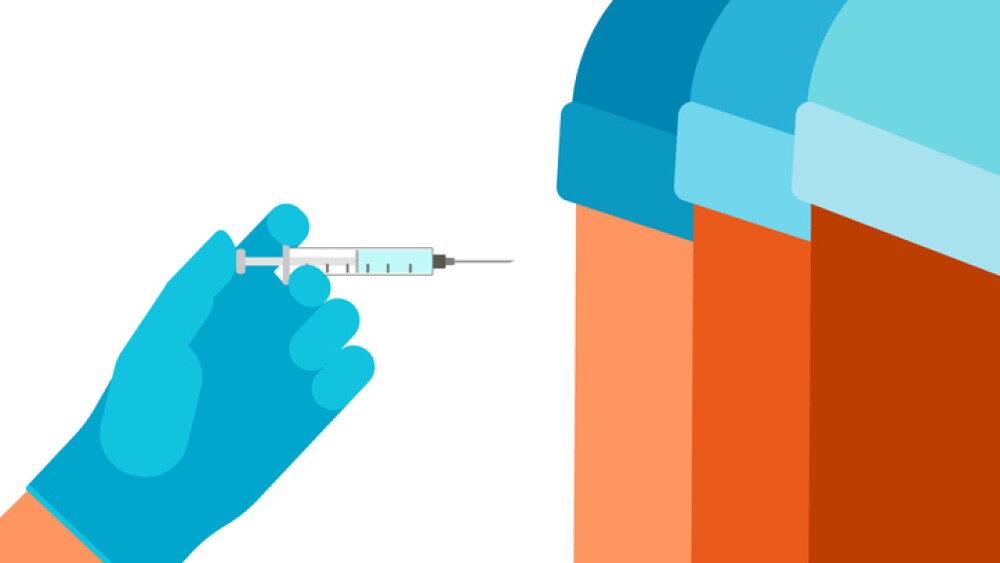WASHINGTON, Dec. 19 /PRNewswire-FirstCall/ -- New clinical data presented at the 45th annual Interscience Conference on Antimicrobial Agents and Chemotherapy (ICAAC) demonstrate that the highest rates of viral suppression with an experimental boosted protease inhibitor (PI), TMC-114/ritonavir, were achieved in patients who initiated the drug in combination with FUZEON(R) (enfuvirtide). The data provide fresh evidence further supporting a new therapeutic strategy for treatment-experienced HIV patients, which was recently recommended in updated Antiretroviral Treatment Guidelines from the U.S. Department of Health and Human Services (DHHS). FUZEON, co-developed by Roche and Trimeris , is the first and only fusion inhibitor available for the treatment of HIV. TMC-114 is an investigational boosted protease inhibitor being developed by Tibotec Pharmaceuticals Ltd.
Investigators reported results of a 24-week phase IIB study of TMC-114/ritonavir, POWER 2, in triple-class experienced patients. Sixty-four percent of patients who received FUZEON for the first time with TMC-114 (600 mg)/ritonavir (100 mg) twice-daily achieved undetectable levels of HIV at 24 weeks (less than 50 copies/mL), compared to 30 percent of patients who received TMC-114/ritonavir without FUZEON.
These findings are consistent with the most recent DHHS guidelines, establishing the use of an active ritonavir-boosted PI and FUZEON to achieve undetectable HIV in treatment-experienced patients. These new guidelines cited several recent clinical trials of new boosted PIs in treatment-experienced patients, demonstrating better and more prolonged virologic response in patients taking FUZEON as part of a regimen that includes these new boosted PIs.
"These data come at a critical time, concurrent with the recent initiation of an international expanded access program for TMC-114/ritonavir," said Edwin DeJesus, M.D., Medical Director, Orlando Immunology Center, Florida. "Treatment-experienced patients who require new therapeutic options may benefit from the simultaneous use of FUZEON with this investigational agent."
Facts About FUZEON
Administered via one 90 mg injection twice-daily, FUZEON is the first and only fusion inhibitor for the treatment of HIV. Unlike other HIV drugs that work after HIV has entered the human immune cell, FUZEON works outside the CD4 cell, blocking HIV from entering the cell. For this reason, FUZEON is effective in treatment-experienced patients who have developed resistance to other anti-HIV drugs, though patients may still develop resistance to FUZEON. FUZEON was granted accelerated approval by the U.S. Food and Drug Administration (FDA) in March 2003 on the basis of 24-week data, and was granted traditional (full) approval on Oct. 15, 2004 on the basis of long-term 48-week data.
Injection Site Reactions (ISRs): ISRs are the most common adverse events associated with FUZEON. ISRs occurred in 98% of patients studied and 4% discontinued FUZEON due to ISRs. Signs/symptoms may include pain and discomfort, hardened skin, redness, bumps, itching and swelling. Eleven percent of patients had local reactions that required analgesics or limited usual activities.
Pneumonia: An increased rate of bacterial pneumonia was observed in subjects treated with FUZEON in the Phase III clinical trials compared to the control arm. It is unclear if the increased incidence of pneumonia is related to FUZEON use. Patients with HIV infection should be carefully monitored for signs and symptoms of pneumonia. Risk factors for pneumonia included low initial CD4 cell count, high initial viral load, intravenous drug use, smoking and a prior history of lung disease.
Hypersensitivity Reactions: Systemic hypersensitivity reactions have been associated with FUZEON therapy and may recur on rechallenge. Hypersensitivity reactions have included individually and in combination: rash, fever, nausea and vomiting, chills, rigors, hypotension and elevated serum liver transaminases. Other adverse events that may be immune mediated and have been reported in subjects receiving FUZEON include primary immune complex reaction, respiratory distress, glomerulonephritis and Guillain-Barre syndrome.
Other Adverse Events: The events most frequently reported in patients receiving FUZEON plus an optimized background regimen were diarrhea (32%), nausea (23%) and fatigue (20%). These events were seen at a lower incidence in patients taking a FUZEON-based regimen compared to those receiving an optimized background regimen without FUZEON when taking into account the uneven number of patients in each arm and the length of time they are in that arm. As measured in number per 100 patient years, the incidence was: diarrhea (38 per 100 patient-years in subjects receiving FUZEON-based regimens vs. 73 per 100 patient-years in patients who did not receive FUZEON), nausea (27 vs. 50, respectively) and fatigue (24 vs. 38, respectively).
Roche in HIV
Roche is at the forefront of efforts to combat HIV infection and AIDS, committed for 15 years to groundbreaking research and development of new drugs and diagnostic technology. The objective is to provide tailored treatment solutions and an improved standard of care worldwide for those people living with HIV.
Roche and Trimeris are working together to discover, develop and commercialize the next generation of HIV fusion inhibitors.
About Roche - More Than a Century in the U.S. and the World
Founded in 1896 and headquartered in Basel, Switzerland, Roche is one of the world's leading innovation-driven healthcare groups. Its core businesses are pharmaceuticals and diagnostics. Roche is one of the world's leaders in diagnostics, the leading supplier of pharmaceuticals for cancer, as well as a leader in virology and transplantation. As a supplier of products and services for the prevention, diagnosis and treatment of disease, the Group contributes on many fronts to improve people's health and quality of life. Roche employs roughly 65,000 people in 150 countries, including approximately 15,000 in the United States.
Roche's U.S. operations celebrate their American Centennial in 2005. In another milestone this year, Roche was named in January to Fortune magazine's list of Best Companies to Work for in America. One of an increasingly rare breed of major healthcare companies that still bear their original name, Roche today has more than a dozen U.S. sites located in California, Colorado, Indiana, New Jersey and South Carolina, as well as in Puerto Rico. Roche has alliances and research and development agreements with numerous partners, including majority ownership interests in Genentech and Chugai. Roche's Pharmaceuticals Division offers a portfolio of leading medicines in therapeutic areas including cancer, HIV/AIDS, hepatitis C, transplantation, dermatology and influenza. Roche's Diagnostics Division supplies a wide array of innovative testing products and services to researchers, physicians, patients, hospitals and laboratories world-wide. For further information, please visit our worldwide and U.S. websites (Global: http://www.roche.com and U.S.: http://www.roche.us).
About Trimeris, Inc.
Trimeris, Inc. is a biopharmaceutical company engaged in the discovery, development and commercialization of novel therapeutic agents for the treatment of viral disease. The core technology platform of fusion inhibition is based on blocking viral entry into host cells. FUZEON, approved in the U.S., Canada and European Union, is the first in a new class of anti-HIV drugs called fusion inhibitors. Trimeris is developing FUZEON and future generations of peptide fusion inhibitors in collaboration with F. Hoffmann-La Roche Ltd. For more information about Trimeris, please visit the company's Web site at http://www.trimeris.com.
Trimeris Safe Harbor Statement
This document and any attachments may contain forward-looking information about the Company's financial results and business prospects that involve substantial risks and uncertainties. These statements can be identified by the fact that they use words such as "expect," "project," "intend," "plan," "believe" and other words and terms of similar meaning. Among the factors that could cause actual results to differ materially are the following: there is uncertainty regarding the success of research and development activities, regulatory authorizations and product commercializations; the results of our previous clinical trials are not necessarily indicative of future clinical trials; and our drug candidates are based upon novel technology, are difficult and expensive to manufacture and may cause unexpected side effects. For a detailed description of these factors, see Trimeris' Form 10-K filed with the Securities and Exchange Commission on March 11, 2005 and its periodic reports filed with the SEC.
Roche; TrimerisCONTACT: Mike Nelson, Roche, +1-973-562-2409, mike.nelson@roche.com; orBethany Greer, Trimeris, Inc., +1-919-419-6050, bgreer@trimeris.com; orRobyn Meyer, Manning Selvage & Lee, +1-212-468-3376, robyn.meyer@mslpr.com




